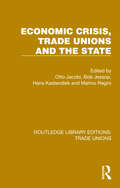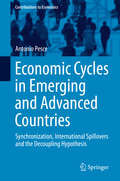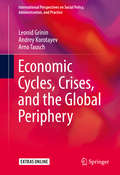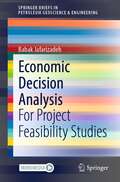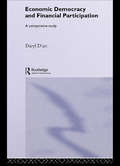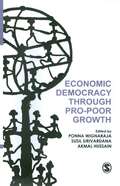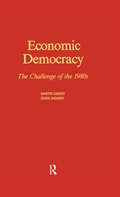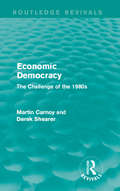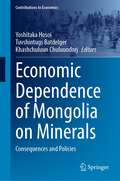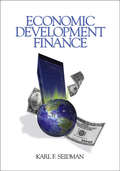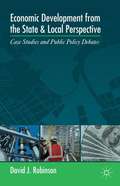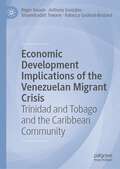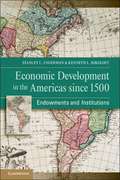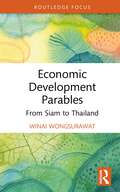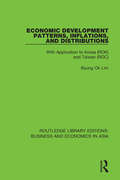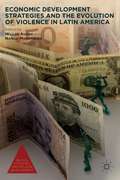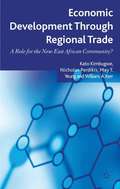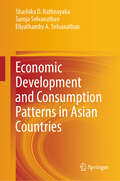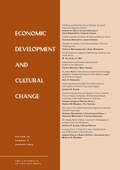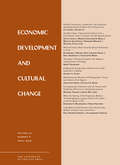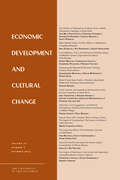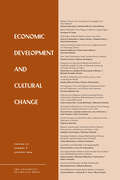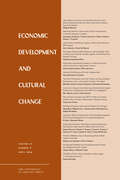- Table View
- List View
Economic Crisis, Trade Unions and the State (Routledge Library Editions: Trade Unions #10)
by Jacobi OttoOriginally published in 1986, this book analyses the impact of the changing economic and political climate on trade unions in Europe. The first part of the book deals with general issues, and the succeeding parts look at developments in the UK, Italy and the former West Germany.
Economic Cycles in Emerging and Advanced Countries
by Antonio PesceThis book contributes to the debate on the decoupling of emerging economies from the advanced economies with a new, empirical investigation approach. Taking counterfactual experiments performed using a time-varying panel VAR model, the author argues that over the last thirty years, emerging economies have become less vulnerable to shocks spreading from advanced economies. This resilience to external shocks has changed in a non-progressive manner over time, with phases of greater resilience followed by others of lower resilience and vice versa. This research outlines its wave-like path and presents new results that contribute to the discussion.
Economic Cycles, Crises, and the Global Periphery
by Leonid Grinin Andrey Korotayev Arno TauschThis thought-provoking monograph analyzes long- medium- and short-term global cycles of prosperity, recession, and depression, plotting them against centuries of important world events. Major research on economic and political cycles is integrated to clarify evolving relationships between the global center and its periphery as well as current worldwide economic upheavals and potential future developments. Central to this survey are successive waves of industrial and, later, technological and cybernetic progress, leading to the current era of globalization and the changes of the roles of both Western powers and former minors players, however that will lead to the formation of the world order without a hegemon. Additionally, the authors predict what they term the Great Convergence, the lessening of inequities between the global core and the rest of the world, including the wealth gap between First and Third World nations. Among the topics in this ambitious volume: #65533; Why politics is often omitted from economic analysis. #65533; Why economic cycles are crucial to understanding the modern geopolitical landscape. #65533; How the aging of the developed world will affect world technological and economic future. #65533; The evolving technological forecast for Global North and South. #65533; Where the U. S. is likely to stand on the future world stage. Economic Cycles, Crises, and the Global Periphery will inspire discussion and debate among sociologists, global economists, demographers, global historians, and futurologists. This expert knowledge is necessary for further research, proactive response, and preparedness for a new age of sociopolitical change.
Economic Decision Analysis: For Project Feasibility Studies (SpringerBriefs in Petroleum Geoscience & Engineering)
by Babak JafarizadehThis book discusses the art and science of economic decision making. It combines logical thinking with analytics, economics, and finance to draw decision insights for the upstream petroleum projects. The book offers useful analysis skills for practitioners in industry, including analysts, engineers, and managers. In addition, advanced undergraduate and graduate students in petroleum engineering, applied petroleum geoscience, industrial engineering, and energy business would benefit from the discussions in this book.
Economic Democracy and Financial Participation: A Comparative Study
by Daryl D'ArtThe ideas of economic democracy and financial participation are not new. The International Congress on profit-sharing first met in Paris in 1889. However since then, the numerous schemes have met with mixed reactions and various levels of success. In Economic Democracy and Financial Participation, Daryl D'Art has two objectives. Firstly, to examine if, and under what conditions, profit-sharing schemes and employee shareholding can motivate workers and generate cooperative striving. Secondly he identifies the schemes of financial participation which have the potential to realise economic democracy within the individual firm and wider society.
Economic Democracy through Pro Poor Growth
by Ponna Wignaraja Susil Sirivardana Akmal HussainThis volume addresses a central dilemma of our times from a perspective based on lessons from the ground—persistence of structural poverty after sixty years of independence amidst rapid economic growth, widening social anomie, political crisis and failing policy. . The collection presents an alternative school of thought which has been evolved by scholars and activists over decades, in which the poor are presented not as the problem but as an essential resource. Among this volume’s distinguishing ideas are: a new role for the poor, raising mass consciousness, a core methodology for transformation, restructuring the state, pro-poor partnerships for all social constituencies, insistence on holism and values, learning from the poor and new social movements, and eschewing a priori thinking. This perspective powerfully argues the validity and feasibility of sustainable and transformative societal change. . The compilation is rich in lucidly presented case studies and illustrative examples. The strategies advocated would catalyse the process of achieving political and economic democracy at the grassroots and facilitate sustainable development. They would also help in the democratization of the phase of transition and growth. This work is an excellent reference source for development economists and students, researchers and faculty studying governance, poverty and human rights, and issues of security and human rights.
Economic Democracy: The Challenge of the 1980's (Routledge Revivals Ser.)
by Martin Carnoy Derek ShearerThis text discusses the economic, social and political implications of redirecting labour and capital from a military-based to a post-Cold War economy.
Economic Democracy: The Challenge of the 1980s (Routledge Revivals)
by Martin Carnoy Derek ShearerThis book is a discussion of and an argument for alternatives to the present structure of production in the United States—alternatives that would change the control of capital and how it is used. First published 1980, Carnoy and Shearer discuss the economic problems facing the 1980s and argue for a strategy to transform capital from corporations to the public. A book that remains relevant in today’s political economic climate, this title is ideal for students of economics and politics, as well as general readers interested in past and present economic problems and potential solutions.
Economic Dependence of Mongolia on Minerals: Consequences and Policies (Contributions to Economics)
by Yoshitaka Hosoi Tuvshintugs Batdelger Khashchuluun ChuluundorjThis book is a compass for resource rich-developing countries, taking Mongolia as a case study. Policy aspects of the development of the mining sector in developing countries such as Mongolia and its impact on the economy and society are reviewed. The book deals with specific industry policies and challenges identified by policy makers, its characteristics and policy recommendations moving forward with an emphasis on the importance of evidence-based policy making (EBPM). It begins with the country’s development strategy and the role of the mining industry, highlighting the fact that major strategic and policy documents still suffer from ambiguity and clear guidance as well as gaps in policy directions. The book also highlights the need for policy makers to improve transparency initiatives. Authors emphasize transparency or lack thereof in mining contracts, taxation, trading, and marketing and provide specific policy recommendations and alternative policy actions. The macroeconomic and social impact of the mining sector and the role of foreign direct investment is also discussed. Particularly, utilizing in-house economic analytical tools, the role and impact of resource revenue management policy in Mongolia is evaluated. Further, the impact of mining projects on the livelihood of local households as well as the importance of obtaining a social license to operate is discussed. This monograph is recommended for readers who want an in-depth comprehensive understanding of the mining sector, EBPM, and key lessons learned in managing natural resources in Mongolia.
Economic Development
by E. Wayne NafzigerE. Wayne Nafziger analyzes the economic development of Asia, Africa, Latin America, and East-Central Europe. The book is suitable for those with a background in economics principles. Nafziger explains the reasons for the recent fast growth of India, Poland, Brazil, China, and other Pacific Rim countries, and the slow, yet essential, growth for a turnaround of sub-Saharan Africa. The fifth edition of the text, written by a scholar of developing countries, is replete with real-world examples and up-to-date information. Nafziger discusses poverty, income inequality, hunger, unemployment, the environment and carbon-dioxide emissions, and the widening gap between rich (including middle-income) and poor countries. Other new components include the rise and fall of models based on Russia, Japan, China/Taiwan/Korea, and North America; randomized experiments to assess aid; an exploration of whether information technology and mobile phones can provide poor countries with a shortcut to prosperity; and a discussion of how worldwide financial crises, debt, and trade and capital markets affect developing countries.
Economic Development Finance
by Mr Karl F. SeidmanEconomic Development Finance is a comprehensive and in-depth presentation of private, public, and community financial institutions, policies and methods for financing local and regional economic development projects. The treatment of policies and program models emphasizes their applications and impact, key design and management issues, and best practices. A separate section addresses critical management issues for development finance programs: program and product design, the lending and investment process, and capital management. Case studies are included throughout the book to help readers develop their skills and apply policies and tools to real practice issues. A glossary of finance terms is also included.
Economic Development From The State And Local Perspective
by David J. RobinsonThis definitive work mixes case law, public policy, economic strategy, and examines the wide range of issues facing efforts to improve the American economy, to illustrate how economic growth is driven through strong public-private partnerships, and how successful growth strategies from the state and local level operate to grow jobs.
Economic Development Implications of the Venezuelan Migrant Crisis: Trinidad and Tobago and the Caribbean Community
by Bhoendradatt Tewarie Roger Hosein Anthony Gonzales Rebecca Gookool-BoslandThis book analyzes the ways in which the Venezuelan immigrant community is making an impact on the social and economic dynamic of small economies. This publication addresses some of the main economic development conversations on trade, labor, and fiscal implications of immigration. This book attempts to collate and unpack some of the relevant theoretical frameworks which provide a basis for policymakers and other key decision-makers. In this regard, the links between immigration and economic development is discussed with a focus on Trinidad and Tobago as a representative case within the Caribbean community.
Economic Development In The Americas Since 1500: Endowments And Institutions
by Kenneth L. Sokoloff Stanley L. Engerman Stephen Haber Elisa V. Mariscal Eric M. ZoltThis book brings together a number of previously published articles by Stanley L. Engerman and Kenneth L. Sokoloff. Its essays deal with differences in the rates of economic growth in Latin American and mainland North America, specifically the United States and Canada. It demonstrates how relative differences in growth over time are related to differences in the institutions that developed in different economies. This variation is driven by differences in major institutions - suffrage, education, tax policy, land and immigration policy, and banking and financial organizations. These factors, in turn, are all related to differences in endowments, climate, and natural resources. Providing a comprehensive treatment of its topic, the essays have been revised to reflect new developments and research.
Economic Development Parables: From Siam to Thailand (Routledge Studies in the Modern World Economy)
by Winai WongsurawatWongsurawat looks at the history of Thailand since the mid-nineteenth century and uses events to elucidate basic economic models and concepts. He selects defining moments in Thailand’s history to convey key economic ideas worthy of classroom discussion.Written without excessive jargon, the chapters connect complex historical phenomena with broader, transportable economic concepts. The cases range from the signing of the Bowring Treaty in 1855, opening Siam to the forces of globalization, to the Asian Financial Crisis that wreaked havoc on the economy in 1997. Key economic terms are also explained. Reconnecting the increasingly distant fields of history and economics, this is an appealing text to researchers with an interest in Thailand’s economic history, as well as undergraduates undergoing an introductory economics course or overseas program in Thailand.
Economic Development Patterns, Inflations, and Distributions: With Application to Korea (ROK) and Taiwan (ROC) (Routledge Library Editions: Business and Economics in Asia #10)
by Byung Ok LimThe focal point of this study, first published in 1991, is to investigate the effect of growth patterns on inflation and the distribution of income through inductive examination of the particular experiences in Korea and Taiwan. Both countries are regarded as models of successful industrialization, but contrast significantly in the matter of their development strategy yielding a more equitable distribution of income, along with a moderate inflation from the benefits of economic growth. Korea experienced considerable rates of inflation and a worsening of the distribution of income, while Taiwan avoided both economic evils. This book analyses how Taiwan’s economy managed to reconcile growth with inflation and distribution and why Korea could not achieve similar performance.
Economic Development Strategies and the Evolution of Violence in Latin America
by Natalia Mirovitskaya William AscherEconomic Development Strategies and the Evolution of Violence in Latin America explores the links between Latin American governments' economic policies and the nature and dynamics of inter-group violence. Based on the patterns of ten countries, the contributions to this volume trace the remarkable transformation from open ideological conflict to the explosion of social (seemingly apolitical) violence, the upsurge of urban crime, and the confrontations over natural resources and drugs across the region spanning from Mexico to Argentina. The variations in economic success and in conflict prevention and transformation can guide policymakers, development professionals, and activists committed to conflict-sensitive development.
Economic Development Through Regional Trade
by Kato Kimbugwe Nicholas Perdikis May T. Yeung William A. KerrPost-colonial Africa is littered with regional trade agreements that amounted to little more than a photo opportunity for the leaders that signed them. This book explores conventional explanations for past failures and posits a new theory rooted in the symbiotic relationship between authoritarian politics and crony-capitalism.
Economic Development and Consumption Patterns in Asian Countries
by Eliyathamby A. Selvanathan Saroja Selvanathan Shashika D. RathnayakaThis book analyzes consumption patterns in Asian countries that are at different stages of economic development and highlights the similarities and disparities of consumption patterns across countries using a system-wide framework. In a departure from previous studies in the literature which mainly present only single-country analysis, this book aims to provide a comprehensive analysis of cross-country consumption patterns considering several Asian countries, using the most recent consumption expenditure data for aggregate commodity groups. In comparing consumption patterns across countries, the book use unit-free measurements such as budget shares and changes in logarithms of price and quantities, thus avoiding problems associated with exchange rate conversions. The book also analyses the dynamic behaviour in the consumption patterns of the Asian consumers. The findings of this book will be invaluable to researchers in development economics as well as policymakers in the formulation of fiscal policy or other types of economic control.
Economic Development and Cultural Change, volume 71 number 2 (January 2023)
by Economic Development and Cultural ChangeThis is volume 71 issue 2 of Economic Development and Cultural Change. Economic Development and Cultural Change (EDCC) publishes studies that use modern theoretical and empirical approaches to examine both the determinants and the effects of various dimensions of economic development and cultural change. EDCC’s focus is on empirical papers with analytic underpinnings, concentrating on microlevel evidence, that use appropriate data to test theoretical models and explore policy impacts related to economic development.
Economic Development and Cultural Change, volume 71 number 3 (April 2023)
by Economic Development and Cultural ChangeThis is volume 71 issue 3 of Economic Development and Cultural Change. Economic Development and Cultural Change (EDCC) publishes studies that use modern theoretical and empirical approaches to examine both the determinants and the effects of various dimensions of economic development and cultural change. EDCC’s focus is on empirical papers with analytic underpinnings, concentrating on microlevel evidence, that use appropriate data to test theoretical models and explore policy impacts related to economic development.
Economic Development and Cultural Change, volume 71 number 4 (July 2023)
by Economic Development and Cultural ChangeThis is volume 71 issue 4 of Economic Development and Cultural Change. Economic Development and Cultural Change (EDCC) publishes studies that use modern theoretical and empirical approaches to examine both the determinants and the effects of various dimensions of economic development and cultural change. EDCC’s focus is on empirical papers with analytic underpinnings, concentrating on microlevel evidence, that use appropriate data to test theoretical models and explore policy impacts related to economic development.
Economic Development and Cultural Change, volume 72 number 1 (October 2023)
by Economic Development and Cultural ChangeThis is volume 72 issue 1 of Economic Development and Cultural Change. Economic Development and Cultural Change (EDCC) publishes studies that use modern theoretical and empirical approaches to examine both the determinants and the effects of various dimensions of economic development and cultural change. EDCC’s focus is on empirical papers with analytic underpinnings, concentrating on microlevel evidence, that use appropriate data to test theoretical models and explore policy impacts related to economic development.
Economic Development and Cultural Change, volume 72 number 2 (January 2024)
by Economic Development and Cultural ChangeThis is volume 72 issue 2 of Economic Development and Cultural Change. Economic Development and Cultural Change (EDCC) publishes studies that use modern theoretical and empirical approaches to examine both the determinants and the effects of various dimensions of economic development and cultural change. EDCC’s focus is on empirical papers with analytic underpinnings, concentrating on microlevel evidence, that use appropriate data to test theoretical models and explore policy impacts related to economic development.
Economic Development and Cultural Change, volume 72 number 3 (April 2024)
by Economic Development and Cultural ChangeThis is volume 72 issue 3 of Economic Development and Cultural Change. Economic Development and Cultural Change (EDCC) publishes studies that use modern theoretical and empirical approaches to examine both the determinants and the effects of various dimensions of economic development and cultural change. EDCC’s focus is on empirical papers with analytic underpinnings, concentrating on microlevel evidence, that use appropriate data to test theoretical models and explore policy impacts related to economic development.
